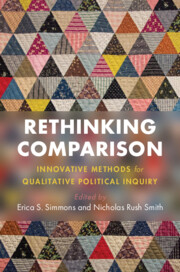Book contents
- Frontmatter
- Dedication
- Contents
- List of Figures
- List of Tables
- List of Contributors
- Acknowledgments
- 1 Rethinking Comparison: An Introduction
- Part I Rethinking the Building Blocks of Comparison
- Part II Developing New Approaches to Comparison through Research
- 7 Comparing Complex Cases Using Archival Research
- 8 Composing Comparisons: Studying Configurations of Relations in Social Network Research
- 9 Against Methodological Nationalism: Seeing Comparisons as Encompassing through the Arab Uprisings
- 10 Comparative Analysis for Theory Development
- 11 Problems and Possibilities of Comparison across Regime Types: Examples Involving China
- 12 Comparisons with an Ethnographic Sensibility: Studies of Protest and Vigilantism
- Theory and Imagination in Comparative Politics: An Interview with Lisa Wedeen
- Index
11 - Problems and Possibilities of Comparison across Regime Types: Examples Involving China
from Part II - Developing New Approaches to Comparison through Research
Published online by Cambridge University Press: 24 September 2021
- Frontmatter
- Dedication
- Contents
- List of Figures
- List of Tables
- List of Contributors
- Acknowledgments
- 1 Rethinking Comparison: An Introduction
- Part I Rethinking the Building Blocks of Comparison
- Part II Developing New Approaches to Comparison through Research
- 7 Comparing Complex Cases Using Archival Research
- 8 Composing Comparisons: Studying Configurations of Relations in Social Network Research
- 9 Against Methodological Nationalism: Seeing Comparisons as Encompassing through the Arab Uprisings
- 10 Comparative Analysis for Theory Development
- 11 Problems and Possibilities of Comparison across Regime Types: Examples Involving China
- 12 Comparisons with an Ethnographic Sensibility: Studies of Protest and Vigilantism
- Theory and Imagination in Comparative Politics: An Interview with Lisa Wedeen
- Index
Summary
During the Cold War, comparisons between the state-socialist bloc and democracies sparked scholarly controversy. With scholars pursuing innovative comparisons between China and other political systems, it behooves us to revisit some of the questions that such comparisons pose. Specifically, when is it reasonable to pursue them, what is their purpose, and what do they entail? Giovanni Sartori usefully cautioned against comparing unlike entities, yet his advice was overly confining. Sometimes gaps or disjunctures between political phenomena in dissimilar political systems provide opportunities for innovation, even if they complicate Mill-style comparison. In particular, such projects can provide intellectual payoffs through the way in which they frame a topic of study, specify its universe of cases, and scrutinize the gains and risks of including phenomena from disparate contexts in a common category. Further, they provide opportunities for conceptual development by elaborating on and exploring these shared phenomena. Such cross-regime comparisons are not always feasible or useful. When successful, however, they can provide rich and thought-provoking new theoretical and conceptual departures. I illustrate this with examples from research projects comparing China with the democratic systems of India, Taiwan, France, and the United States.
Keywords
Information
- Type
- Chapter
- Information
- Rethinking ComparisonInnovative Methods for Qualitative Political Inquiry, pp. 208 - 230Publisher: Cambridge University PressPrint publication year: 2021
Accessibility standard: Unknown
- 4
- Cited by
